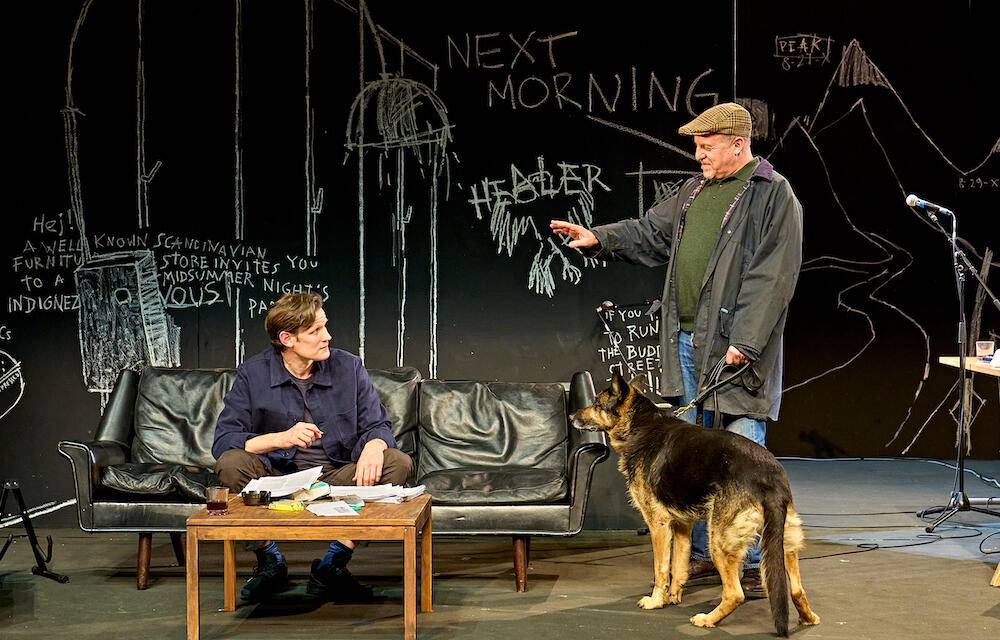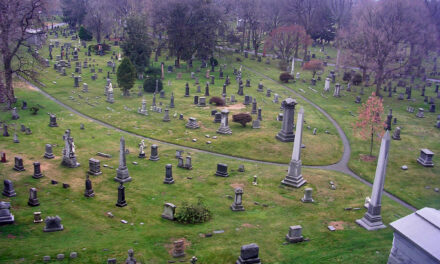It’s a sign of the times that German director Thomas Ostermeier’s West End debut is his production of An Enemy of the People, which has been rep at his Schaubühne theatre for over a decade. With a starry cast led by Matt Smith, whose pulling power is indisputable, this classic Ibsen state-of-society drama from 1882 has been reconfigured to better chime with our current preoccupations — from viruses to virtue signalling. Having already brought his German-language version from Berlin to London’s state-subsidized Barbican in 2014, Ostermeier now conquers the commercial sector. And of course, like Jez Butterworth’s The Hills of California, it has been hyped up as the theatre event of the year. But is it any good?
Ostermeier and Florian Borchmeyer’s contemporary adaptation follows Ibsen’s familiar story pretty closely. In a small town which depends on the public visiting its healing waters for prosperity, Dr Thomas Stockmann (Smith) — local medical officer — discovers that this natural resource is being polluted by the factory run by his wife Katharina’s father, Morten Kiil. Although Thomas is encouraged to speak out about the health hazard by Hovstad, editor of the local newspaper, and his sidekick Billing, he is opposed by the mayor Peter, who is his brother, as well eventually by the publisher and landlord’s rep Aslaksen and Morten. They argue that if his concerns are publicized then the town’s economy will collapse. So Stockmann’s dilemma is whether to tell the truth, or lie for the greater good.
It’s no surprise, given Ibsen’s own negative experiences of being criticised for telling unpalatable truths in his previous play Ghosts, that this ethical problem has only one outcome. The heroic Stockmann persists in his truth-telling and is socially ostracized, becoming as the play’s title alerts us, an enemy of the people. As always with Ibsen, the plotting is outstandingly tight and the story has a cruel inevitability and an emotional punch. Except that here this is muted by the director’s additions, which are often frankly puzzling. At the start, Thomas, Katharina, Hovstad and Billing are in a rock band, which means we get to hear them play Kate Bush’s “Hounds of Love” and David Bowie’s “Changes”, but then this conceit is quietly dropped. Is it just an excuse to play some loud music?
Other additions include a brief snatched kiss between Katharina and Hovstad, an onstage and very vocal newborn baby, which then disappears from sight and sound, and a real-life Alsatian dog, Leyla, who is meant to be menacing but is actually distractingly sweet. Duncan Macmillan’s English-language version has too many speeches which repeat and repeat and repeat that Thomas is a noble man who is committed to truth, while at the same time showing us a husband who hides information from his wife, is nerdishly naïve and literally prefers to pursue his own beliefs rather than consider the effect of his revelations on the lives of his fellow citizens. The trouble with casting Smith in this role is that his personal charisma completely detracts from the unpleasantly selfish character at the centre of the drama.
If you can stomach the additions, Ostermeier does direct the first half of the play with meticulous attention to detail and with a kind of impassioned naturalism that conveys a powerful sense of real humanity. Everyone is busy in this production; no one stands still. Although parents might raise an eyebrow at the vigor with which Thomas and Katharina rock their newborn babe, most of the other interactions are emotionally true: Paul Hilton’s Peter is particularly excellent in his interactions with Smith, giving vent to exasperation and showing us a convincing reading of sibling rivalry. Likewise, Jessica Brown Findlay’s Katharina and Shubham Saraf’s Hovstad deliver detailed performances.
Things go downhill in the second half. Thomas’s townhall appeal to the local population is staged with the houselights up and invites the audience, literally, to participate as a citizens’ assembly. Although we can mutter disapproval at Peter’s manipulative charm and Aslaksen’s reactionary posturing, it is Smith who grabs the mic and our attention with a mind-boggling rant which denounces everything in capitalist consumer culture, from unemployment to house prices, food banks to swamp draining, and everyday alienation to corporate greed. There are contemporary British references to the Post Office software scandal and London’s Coliseum theatre. It’s a ragbag of issues.
The trouble is that although I agree with some of Thomas’s analysis, Smith’s delivery is so energetic and full of fury that it starts to signify nothing. Like all rhetoric it is exciting to listen to, but painful to think about: if the entire world is so corrupt, then politics is impossible. Conclusion: you don’t need to do anything about anything. Following Ibsen’s original, Thomas finally turns on the “masses”, calling people stupid, which today sounds frankly reactionary. He also blames liberal progressives, the wokerati, for all of society’s ills, which nowadays feels fascistic. But hey, this is Matt Smith so the audience, who are asked to vote on the truth of what he says, heartily endorse him. It is the triumph of charisma over reason — and the star-struck audience embraces the hipster vibe. Dismal.
Ostermeier’s punk-inflected aesthetic makes its own statement about the play’s society. Thomas’s home life resembles a 1960s commune or a 1980s squat, with its untidy student coolness. Of course, this presents a sharp contrast with Peter’s suit-wearing respectability, but it does cast Thomas, Katharina, Hovstad and Billing as young radicals who are outsiders from the start. This is illustrated by the set, designed by Jan Pappelbaum, which features graffiti scrawled on matt black walls, and which are then whitewashed as power gains the upper hand, and by the curtain which is covered with a long paragraph about the poverty of everyday life reminiscent of the 1968 situationists, or other French theorists of the total domination of capital.
The punk vibe culminates with Thomas’s former allies, from Hovstad and Billing to Aslaksen, turning into paint-bombing rioters as the townsfolk physically attack Thomas. But although the play is dominated by Smith’s energy and rapid-fire delivery, there’s a distinct feeling that his wild talk is simply radical posturing; his demagoguery has passion, but it’s empty. And if anyone can sell conspiracy theory, he can. The rest of the cast — Priyanga Burford’s efficient Aslaksen, Zachary Hart’s creepy Billing, Nigel Lindsay’s underpowered Morten and Leyla the dog — offer good support, but the production remains a prime example of unsubtle directing and political posturing. But hey, it’s a good chance to see Matt Smith on stage.
- An Enemy of the People is at the Duke of York’s Theatre until 13 April.
This post was written by the author in their personal capacity.The opinions expressed in this article are the author’s own and do not reflect the view of The Theatre Times, their staff or collaborators.
This post was written by Aleks Sierz.
The views expressed here belong to the author and do not necessarily reflect our views and opinions.


















